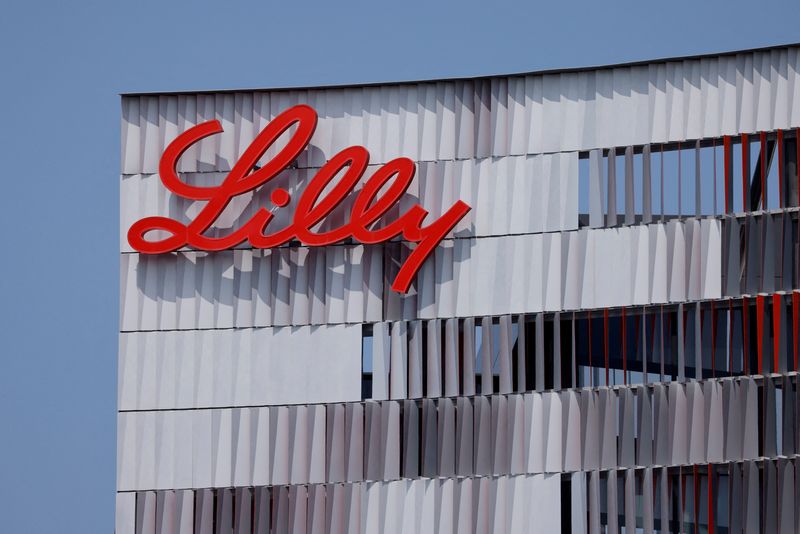By Julie Steenhuysen and Patrick Wingrove
(Reuters) -The U.S. Food and Drug Administration has delayed its decision on Eli Lilly (NYSE:LLY)'s experimental treatment for early Alzheimer's disease and will hold a meeting of outside experts to discuss its safety and efficacy, the company said.
The FDA's decision came as a surprise to company officials and many Alzheimer's experts, who had expected a full approval for Lilly's drug donanemab this month based on clinical trial data last year that showed the treatment was safe and effective.
No date has been set for the advisory committee meeting, but it could be several months before it is held. Eli Lilly shares were down 3%, while shares of Biogen (NASDAQ:BIIB), which sells a rival drug, were up more than 2%.
This marks the second delay for the eagerly anticipated treatment by the FDA after it declined to grant accelerated approval for the medicine a year ago.
Drugs like donanemab, which slow disease progression in early-stage patients, represent a new era in the treatment of Alzheimer's, after three decades of failed attempts to fight the fatal disease that affects more than 6 million Americans, according to the Alzheimer's Association.
"This was definitely unexpected," Anne White, president of Lilly Neuroscience, said in an interview, adding that the news came very late in the review process and the company had been ready to launch the drug.
White said the FDA wants the expert panel to discuss some of the unique aspects of the clinical trial used in its request for a traditional FDA approval, including issues around efficacy and safety.
The FDA had conducted advisory committee meetings before approving Eisai and Biogen's Leqembi, which received standard authorization last year and works in a similar manner. The agency declined to comment on its decision.
Given by infusion once a month, donanemab is designed to clear a toxic Alzheimer's-linked protein called beta amyloid from the brain.
The treatment slowed progression of memory and thinking problems by 22% to 29% overall in a large clinical trial, roughly comparable to the 27% slowing seen with Leqembi.
In patients with low-to-medium levels of a second Alzheimer's related protein called tau, the drug slowed disease progression by 35.1% compared with placebo.
Brain swelling, a known side effect of this type of drug, occurred in 24% of the donanemab treatment group, while brain bleeding occurred in 31% of the donanemab group and about 14% of the placebo group.
In the trial, participants could stop treatment as soon as brain imaging showed that the drug had cleared the amyloid.
Lilly's White said that design, as well as the use of tau to group patients and assess the drug's benefit, were likely to be discussed at the advisory meeting.
'EXTRA CAUTION'
Experts said the drug's association with brain swelling and bleeding could be at issue. Three people on the treatment in the company's trial died.
Dr. Erik Musiek, a Washington University neurologist at Barnes-Jewish Hospital in St. Louis, had expected the drug to be approved this month. He pointed to donanemab's higher rates of serious side effects compared with Leqembi as one possible reason's for the FDA's "extra caution."
Allowing patients to stop treatment once the drug has done its job of removing amyloid could also be a factor, but Musiek sees that as an advantage over Leqembi, which is given twice a month indefinitely.
Dr. Mary Sano, director of the Alzheimer’s Disease Research Center at Mount Sinai in New York, suggested that the FDA may be struggling with how to manage patients who stop the treatment and later need to restart it, which could expose them to additional side effects.
"These are not drugs without adverse events. They're not drugs that are inexpensive, and they're time-consuming for the patient. You really want to make sure that they're value-added," she said.
Leqembi costs $26,500 per year for an average patient.
Indianapolis-based Lilly said there was no change to its 2024 financial forecast.

Analysts on average expect donanemab sales of $189.6 million in 2024, rising to $837 million next year, according to LSEG data. In February, Lilly forecast 2024 revenue of $40.4 billion to $41.6 billion, driven largely by its weight-loss and diabetes drugs.
BMO Capital Markets analyst Evan Seigerman said he believes Lilly's drug will ultimately prevail. "The data is good. It's relatively safe and checks all the boxes."